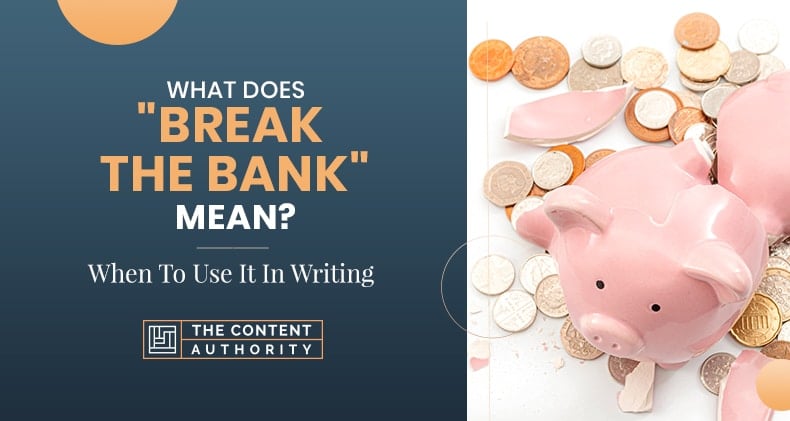Idioms can provide linguistic messages for almost every type of situation that occurs in life. There are expressions to express successes, joys, challenges, failures, home realities, disappointments, sadness, and even financial issues. Apart from being simply fascinating, the list of idioms and their applications is endless, hence the importance of knowing them and handling them appropriately according to the succession of events that we face in our daily lives.
The expression “Break the bank” indicates we can’t afford something due to its high price. There’s also another meaning related to gambling, when a person wins a contest and there’s not enough money to pay the prize, that person broke the bank. This idiom is used to convey a negative statement.
You don’t have to be a tycoon or a great investor for financial events to occur daily in the lives of ordinary people. The reality is that the economy and its repercussions in everyone’s life is something totally normal and common in the daily life of society, it is so common that this type of event can occur up to several times during the same day and it’s important for us to understand its language implications.
Definition Of The Phrase “Break The Bank”

“Break the bank” has become a very popular phrase over the years. Some experts argue that it has two main definitions while others claim that this idiom has not 2 but 3 main meanings.
In any case we are not going to discuss in this opportunity who is right and why, what we are going to do is to review the current that holds the largest number of concepts attributable to this idiomatic expression, since the more we know about the range of definitions available, the more prepared we will be to use it in practice.
- “Break the bank” means that all available financial or economic resources have been exhausted in order to execute a commercial transaction.
- Without leaving the economic aspect we can find that “Break the bank” is used to express when someone has won more money than is available to be paid, this definition is used only within the context of casinos or games of chance.
- This is the definition that generates the most controversy since one current considers it practically the same as main definition #1, however it is interesting to know it because it is a use that in practice is also given to the phrase. In this case “Break the bank” is used to say that someone has lost all his money.
Origin Of The Phrase “Break The Bank”

Like most of the idioms “Break the bank” does not escape the reality usually found with these idiomatic expressions concerning the scarce or nonexistent availability of objective sources that support the data of its origin, as happens with many phrases, the authenticity of the stories that surround this expression is totally unprovable.
Nevertheless, the particular case of “Break the bank” is very interesting since, unlike other idioms, multiple stories and nice anecdotes can be found that helped to build what this expression is today. Let’s review some of these versions and anecdotes.
According to this origin of unknown source, it is not surprising that the birth of “Break the bank” is financial. Many experts believe that the term was created around the year 1600. At that time, gamblers in casinos won much more money than the betting house or bank itself, which made it unfeasible for the house to pay the amount won by gamblers.
Other experts place the origin of “Break the bank” around 1873 when an English player named Joseph Jagger was playing roulette in Monte Carlo and won a prize of 350,000 dollars in a single night, which represented a millionaire figure at that time.
Continuing with the speculations about the origin of the phrase “Break the bank”, a version tells the story of a gentleman named Charles De Ville Wells, who in 1891 also won an astronomical amount in Monte Carlo. At that time, the story goes that each table had a maximum limit of 100,000 francs in prizes to be distributed per night, so if a player at a table won more than the stipulated maximum prize that night, that table was closed and the croupier threw a black cloth indicating that it was “broke” until the necessary funds could be collected again to recover the loss and generate profits that would justify opening it again.
Because of Mr. Wells’ feat, a music hall song was written about his exploits, the song was entitled “The man who broke the bank at Monte Carlo”. There was always doubt about the legitimacy and transparency of his victory because it later became known that he had a rather shady reputation that pointed to him as a swindler, this anecdote explains very clearly and graphically the alleged origin of “Break the bank”.
Although the version of the origin of the phrase in games of chance is very widespread, other historians give a twist to this creation of “Break the bank”. They refer to the ancient custom of storing money in ceramic banks, better known today as piggy banks.
Since the first piggy banks did not have a removable stopper to withdraw the money, the only way to access the money was to break the piggy bank. People’s money remained in the bank at all times except in cases of dire financial need, which is why “Break the bank” is credited with its definition as the act of exhausting all financial resources.
“Break the bank” was also the name of a 1948 quiz show. Its original version was hosted by Bert Parks and had several versions in 1976, 1985, and in the 2000s. This quiz show featured a questionnaire of questions that contestants had to answer for a chance to win money, and those winnings had to be wagered to be eligible for a $250,000 jackpot.
In another of the varied anecdotes related to this phrase, reporter Mark Bowden told the story of blackjack player Don Johnson. Mr. Johnson “broke the bank” in 2011, winning almost 6 million dollars at the Tropicana casino in Atlantic City after having taken 5 million dollars from the Borgata casino and 4 million from Caesars Palace in Las Vegas. After these awards, these casinos in one way or another, refused to play with Mr. Johnson.
In 2005, English-born investor Paul Newey almost broke the bank at Birmingham’s Genting Casino Star City where he made £3 million and forced its owner to issue a profit warning causing the casino’s value to fall by 12%
How People Use The Phrase “Break The Bank”

After understanding the meaning and origin of this witty phrase, it is appropriate to review some of the primary meanings and novel twists that many of the people who use it have given it. This phrase is usually used to indicate:
- Someone is interested in saving money.
- Someone is looking to purchase something that is very inexpensive.
- Certain places offer an experience of luxury and comfort.
- Something of quality can be achieved without going bankrupt.
- Someone that it is not necessary to spend a lot of money to convey a good impression to someone else.
- Good things sometimes cost money.
- One must search patiently to find good products without spending a lot of money.
- Good ideas don’t usually cost money.
- Someone that they should not be ashamed for not flaunting expensive items.
- Someone should not get carried away by expensive appearances.
- There are nice and pleasant places without the need to invest a lot of money.
- Someone is very well-groomed without needing to have fancy clothes or clothing.
Other meanings include:
- To tell someone not to get carried away by the emotion of the moment
- To recommend a thorough price check before making a mistake
- To recommend a place with low prices
Examples Of The Use Of The Phrase “Break The Bank” In Everyday Sentences
As we have already seen, this ingenious phrase gives for much more than we thought. We do not detect twists at first sight that make it very curious and unusual to enrich our everyday conversations. See below some practical examples of “Break the bank”:
- I’m thinking of booking a nice beach spot without breaking the bank.
- When we plan ahead for the remodeling project, we are decreasing unforeseen events and the possibility of breaking the bank.
- Everyone tells me they liked my makeover and think I broke the bank to get it done if they only knew how cheaply it all worked out.
English Idioms
Conclusion
The phrase “Break the bank” has tremendous importance in everything related to its correct and adequate use in the aspects related to the economy of the citizen in general. As you can see there are several applications for this idiom in our everyday lives.
When the meaning and uses of the usual idioms are properly understood, a kind of intense desire to put them into practice immediately is awakened.
This is nothing more than the connection between sender, receiver, and message, which is not easy to achieve in all cases, hence the great value of idiomatic expressions, such as “Break the bank” created by the people and for the people.
Shawn Manaher is the founder and CEO of The Content Authority. He’s one part content manager, one part writing ninja organizer, and two parts leader of top content creators. You don’t even want to know what he calls pancakes.

